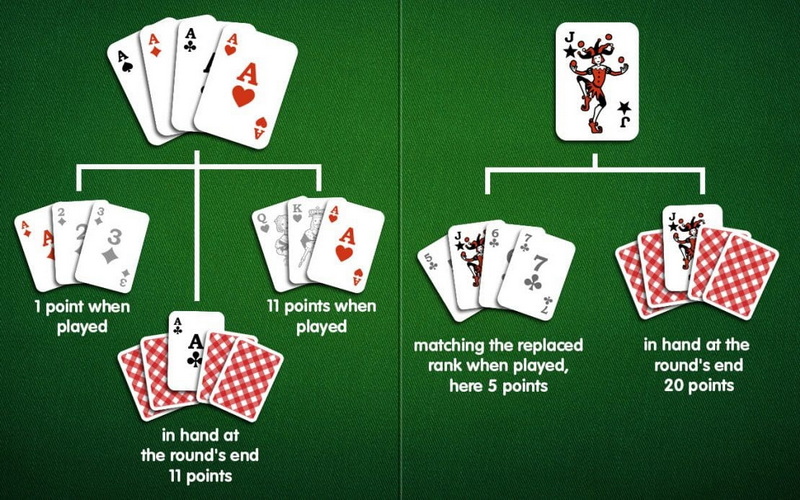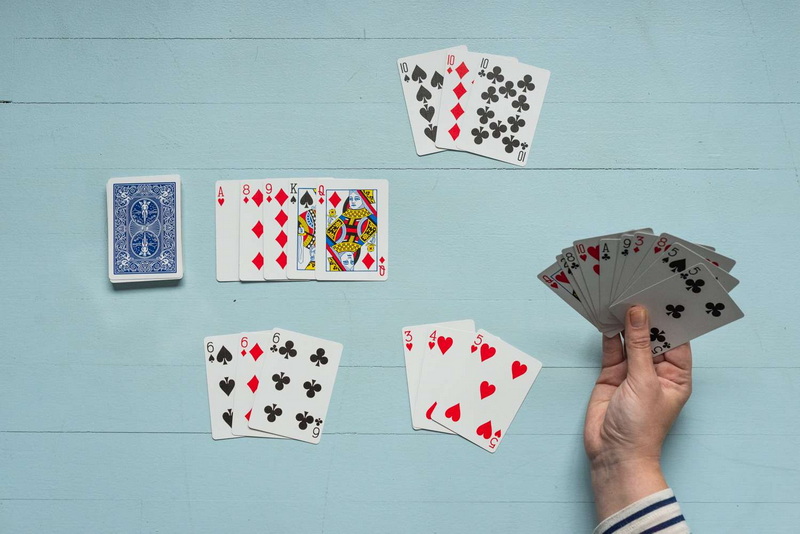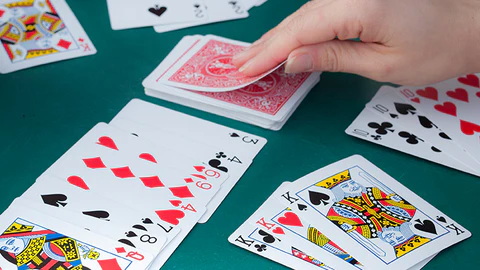Content Menu
● Understanding the Basics of Rummy
● Game Play Overview
● Types of Melds
● Winning Conditions
● Strategies to Win at Rummy
● Common Variations of Rummy
● Tips for Beginners
● Advanced Strategies for Experienced Players
● Social Aspects of Playing Rummy
● Conclusion
● Frequently Asked Questions
>> 1. What are the basic rules of Rummy?
>> 2. How many players can play Rummy?
>> 3. What is a pure sequence in Rummy?
>> 4. How do points work in Rummy?
>> 5. Can I play Rummy online?
● Citations:
Rummy is a classic card game that combines skill, strategy, and a bit of luck. The objective is to form valid sets and sequences with the cards in your hand while trying to minimize the points left when opponents declare. This article provides a comprehensive guide on how to play Rummy, including the rules, strategies, and tips to enhance your gameplay.

Understanding the Basics of Rummy
Rummy can be played with two or more players using a standard deck of 52 cards. The game is typically played with 2 to 6 players, but it can accommodate more by using multiple decks. Here are some key points about the game:
- Objective: The main goal is to form valid combinations of cards known as melds. These can be either sets (three or four cards of the same rank) or runs (three or more consecutive cards of the same suit).
- Card Values: In Rummy, cards have specific point values. Numbered cards (2-10) are worth their face value, face cards (Jack, Queen, King) are worth 10 points each, and Aces can be worth either 1 point or 11 points depending on their use in sequences.
- Game Setup: Each player is dealt a specific number of cards based on the number of players. Typically, players receive:
- 10 cards each for 2-4 players
- 6 cards each for 5-6 players
The remaining cards form the stock pile, and the top card from this pile is placed face up to start the discard pile.
Game Play Overview
Rummy is played in turns, moving clockwise around the table. Here's how a typical turn unfolds:
1. Drawing Cards: At the beginning of your turn, you must draw one card from either the stock pile or the discard pile.
2. Melding: After drawing, you can choose to lay down any valid melds on the table. You can only meld once per turn unless you are adding to an existing meld.
3. Discarding: To end your turn, you must discard one card onto the discard pile.
4. Ending a Round: A round ends when one player gets rid of all their cards by melding them into valid sets/runs or when the stock pile runs out.
Types of Melds
Understanding melds is crucial for playing Rummy effectively:
- Sets: A set consists of three or four cards of the same rank but different suits (e.g., 7♠, 7♥, 7♦).
- Runs: A run consists of three or more consecutive cards of the same suit (e.g., 5♣, 6♣, 7♣).
- Pure Sequence: A pure sequence contains no jokers and is essential for declaring Rummy in some variations.
- Impure Sequence: An impure sequence includes at least one joker which substitutes for any card needed to complete the sequence.
Winning Conditions
To win a game of Rummy:
1. You must have at least two valid melds.
2. One of these melds must be a pure sequence.
3. You declare Rummy by laying down all your melds and discarding your last card.
Strategies to Win at Rummy
Winning at Rummy requires strategic thinking and careful planning. Here are some effective strategies:
- Focus on Pure Sequences: Prioritize forming a pure sequence early in the game as it is mandatory for winning.
- Observe Opponents: Keep an eye on what cards other players are picking up and discarding. This will help you deduce what they might be trying to form.
- Manage High-Value Cards: Try to get rid of high-point cards early on to minimize potential losses if someone else declares first.
- Use Jokers Wisely: Incorporate jokers into your melds strategically but aim to build pure sequences whenever possible.
- Stay Flexible: Be prepared to change your strategy based on how other players are playing and what cards you draw.

Common Variations of Rummy
Rummy has several popular variations that introduce unique rules and gameplay dynamics:
- Indian Rummy: Played with two decks and requires at least two sequences with one being a pure sequence.
- Gin Rummy: A two-player version where players aim to form sets and runs while minimizing their deadwood (unmatched cards).
- Canasta: A variant that uses two decks and requires players to form melds of seven or more cards.
- Kalooki: This variation allows for more complex strategies involving multiple decks and specific rules about melding and laying off cards.
- Oklahoma Rummy: Similar to Gin Rummy but with unique scoring rules based on the first card drawn from the discard pile.
Tips for Beginners
If you're new to Rummy, consider these tips:
- Learn the Rules Thoroughly: Familiarize yourself with all aspects of gameplay before starting.
- Practice Regularly: The more you play, the better you'll understand strategies and improve your skills.
- Play with Experienced Players: Playing with seasoned players can help you learn faster through observation and experience.
- Keep Your Hand Balanced: Aim for a mix of high-value and low-value cards in your hand to maintain flexibility in forming melds while minimizing point loss if someone declares first.
- Don't Hoard Cards: Holding onto too many unmelded cards can lead to significant point losses if another player wins before you do.
Advanced Strategies for Experienced Players
For those who have mastered the basics and want to elevate their game further, consider these advanced strategies:
- Card Counting: Keep track of which cards have been played and which are still in play. This knowledge can inform your decisions about which cards to keep or discard.
- Bluffing Techniques: Occasionally discarding high-value cards that may seem useful can mislead opponents about your hand's strength.
- Adapt Your Play Style: Depending on whether you're playing aggressively or defensively based on your hand's strength can influence your overall success in matches.
- Endgame Awareness: As the game progresses towards its conclusion, shift focus toward minimizing points rather than forming new melds if you're behind in score.
Social Aspects of Playing Rummy
Rummy is not just about competition; it also carries significant social elements that make it enjoyable:
- Building Relationships: Playing Rummy with friends or family fosters camaraderie and strengthens bonds through shared experiences over time spent together at the table.
- Learning Patience and Sportsmanship: The nature of Rummy teaches valuable lessons about patience—waiting for that perfect card—and sportsmanship—accepting losses gracefully while celebrating victories humbly.
- Creating Traditions: Many families develop traditions around playing games like Rummy during holidays or gatherings, making it a cherished part of their culture.
Conclusion
Rummy is a thrilling card game that combines strategy and luck. By understanding its rules, practicing regularly, and employing effective strategies, players can significantly enhance their chances of winning. Whether you're playing casually with friends or competitively online, mastering Rummy can lead to hours of fun and engagement while also fostering social connections among players.

Frequently Asked Questions
1. What are the basic rules of Rummy?
The basic rules include forming valid sets and runs with your hand while drawing from either the stock or discard piles during your turn. Players must also discard one card at the end of their turn.
2. How many players can play Rummy?
Rummy can be played by two or more players; however, it is most commonly played with 2 to 6 players using one or multiple decks as needed.
3. What is a pure sequence in Rummy?
A pure sequence consists of three or more consecutive cards in the same suit without using any jokers or wildcards.
4. How do points work in Rummy?
Points are calculated based on remaining unmatched cards in players' hands after someone declares. Numbered cards are worth their face value; face cards are worth ten points; aces can vary between one or eleven points depending on their use in sequences.
5. Can I play Rummy online?
Yes! Many platforms offer online versions of Rummy where you can play against others globally while following standard rules or specific variations.
Citations:
[1] https://www.rummy-palace.com/how-to-play-rummy/
[2] https://www.youtube.com/watch?v=M_9aW1ZGgS4
[3] https://www.getmega.com/rummy/learn/tips-tricks-in-rummy/
[4] https://www.mplgames.com/blog/rummy/
[5] https://www.dummies.com/article/rummy-understanding-the-rules-and-starting-a-game-193770
[6] https://www.gamezy.com/card-games/rummy/tips-and-tricks/
[7] https://rcmg.in/rc/acquisition/how-to-play-rummy-page-images/how-to-play-rummy.jpg?sa=X&ved=2ahUKEwj8h8rZqcWKAxWWvokEHa_yHwIQ_B16BAgGEAI
[8] https://do2learn.com/activities/cardgames/basic_rummy.htm
































